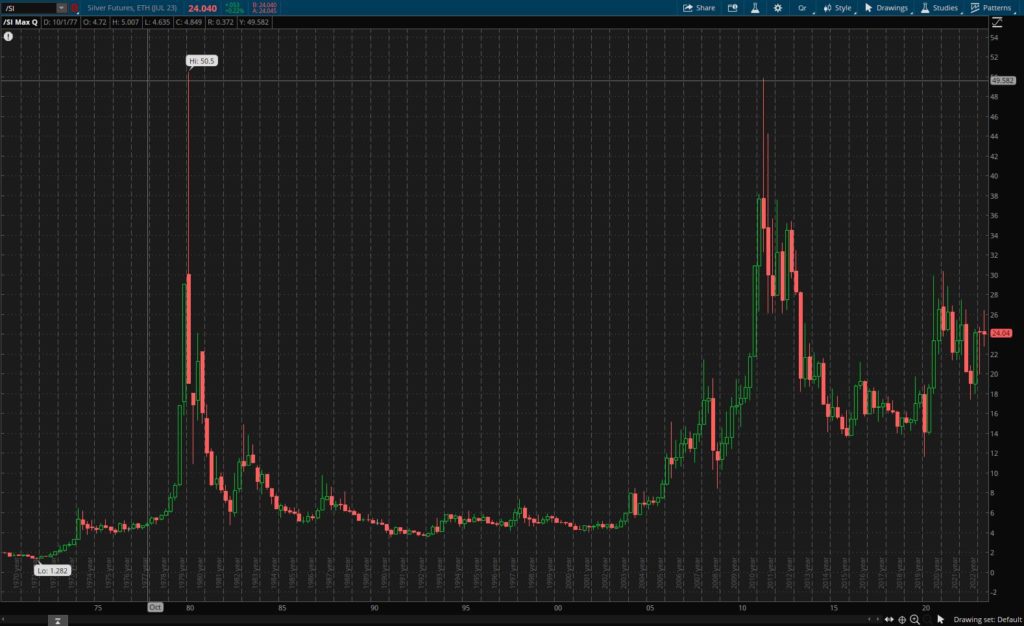In the annals of financial history, few events have captured the imagination quite like the Hunt brothers’ attempt to corner the silver market. The audacious plan unfolded in the late 1970s, as the wealthy Texas oil magnates Nelson Bunker Hunt and William Herbert Hunt set out to amass a vast fortune by manipulating the price of silver. However, what began as a bold venture ultimately led to their downfall, leaving a trail of financial devastation and serving as a cautionary tale of the perils of market manipulation.
At the heart of the Hunt brothers’ endeavor was their belief that silver, like gold, would appreciate significantly due to inflation and the weakening value of the U.S. dollar. Fuelled by this conviction, the brothers embarked on a mission to acquire as much physical silver as possible, aiming to gain control over the global silver market.
The Hunt brothers began accumulating silver in the early 1970s, steadily increasing their holdings. Their initial approach involved purchasing physical silver and silver futures contracts, which provided leverage for their ambitious plans. As their hoard grew, so did their influence in the market, sparking concerns among fellow investors and financial institutions.
By the late 1970s, the Hunt brothers’ actions had caught the attention of the wider financial community. The price of silver began to skyrocket, fueled not only by the Hunt brothers’ buying spree but also by widespread speculation and fear of an impending shortage. Investors and speculators flocked to silver, hoping to ride the wave of escalating prices.
The price of silver surged from around $6 per ounce in 1979 to a peak of nearly $50 per ounce in January 1980. The Hunts’ net worth skyrocketed, with estimates suggesting it reached a staggering $8 billion during the peak of the market frenzy. At this point, it seemed as though the Hunt brothers’ audacious gamble was paying off.

However, the tide began to turn against the Hunt brothers when the Commodity Futures Trading Commission (CFTC) stepped in to investigate potential market manipulation. Concerns over the outsized positions held by the Hunts, along with mounting pressure from other market participants, prompted the CFTC to introduce new regulations aimed at curbing excessive speculation.
As the CFTC enacted stricter limits on futures trading, the Hunt brothers found themselves trapped in a rapidly declining market. The price of silver plummeted, triggering a cascade of margin calls and forced liquidations. The Hunts were unable to meet their financial obligations, and their empire began to crumble.
In the aftermath of the Hunt brothers’ failed venture, financial institutions and investors faced significant losses. Many banks that had provided financing to the Hunts faced severe financial strains and required bailouts. The collapse of the Hunts’ silver empire also revealed the vulnerabilities of the futures markets and highlighted the need for stricter regulation and oversight.
The Hunt brothers’ story serves as a stark reminder of the dangers of attempting to manipulate markets for personal gain. Their ambitious plan, driven by a belief in their ability to control a market as vast as silver, ultimately proved to be their downfall. The silver market, while volatile at times, is ultimately driven by fundamental supply and demand dynamics that cannot be easily manipulated.
The failure of the Hunt brothers in cornering the silver market remains a defining moment in financial history. Their bold attempt to control the price of silver ended in ruin, leaving a trail of financial devastation in its wake. The story of the Hunt brothers serves as a reminder that even the most audacious market maneuvers can be brought down by regulatory intervention and the inherent forces of supply and demand.





